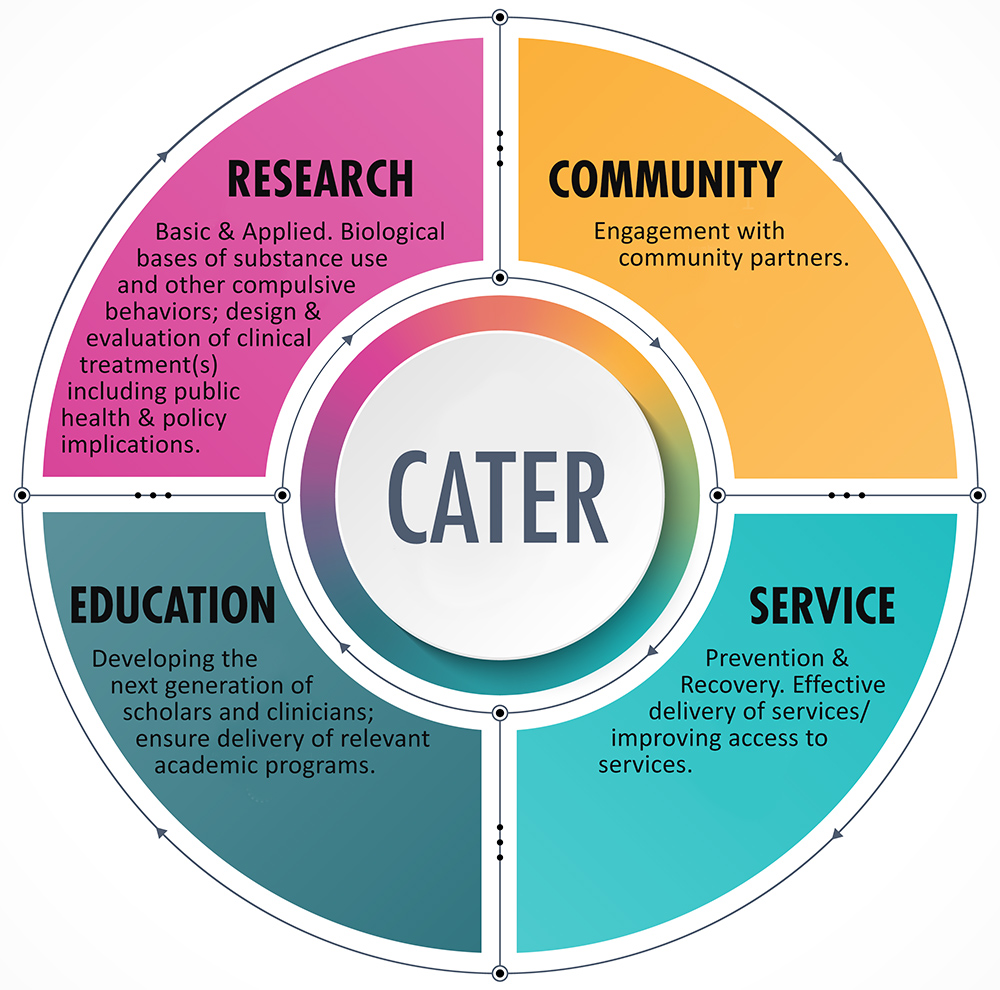Collaboratory on Addiction Treatment, Education and Research (CATER)
The Drexel Collaboratory on Addiction Treatment, Education and Research (CATER) promotes prevention, treatment and recovery from substance use and other compulsive behaviors through academic activity focused on research, education, service and community engagement.
The Drexel Collaboratory on Addiction Treatment, Education and Research harnesses the efforts of a multidisciplinary team of clinicians, researchers (basic and applied) and educators who work together to develop innovative approaches that:
- Prepare clinicians in all disciplines to address the needs of a diverse and growing population
- Generate and test novel solutions for improving the lives of those suffering from an addictive disorder
- Disseminate new, evidence-based knowledge and care models via community engagement strategies and a wide range of professional outlets

Magnitude of the Problem
According to the United Nations Office on Drugs & Crime, an estimated one-quarter of a billion people, or around 5% of the global adult population, used illicit substances at least once in 2021, with 29.5 million of those individuals suffering from substance use disorders, meaning that their drug use is harmful to the point that they may experience dependence and require treatment.
Yet with fewer than one in six persons with substance use disorders provided treatment each year, the availability of and access to evidence-based services remains limited. Against this backdrop is compelling evidence in support of the efficacy of treatment for addictive disorders.
CATER Leadership

Robert Sterling, PhD

Sharlene Irving, MBA

Rikki Patton, PhD, IMFT-S (OH), AAMFT Approved Supervisor
Addiction Research, Treatment and Education Articles
“Tranq or Xylazine: What You Need to Know About the Crisis in Philadelphia”
While fentanyl continues to dominate headlines related to drug overdose in America, it is not the only dangerous drug in town. Tranq, zombie drug, tranq dope, sleep cut and Philly dope are some of the slang names for a large-animal tranquilizing drug called xylazine that’s burst onto the scene of illegal street drugs. Read more.
“What You Need to Know About Marijuana Use During Pregnancy”
Marijuana use is increasing. It is becoming more accepted as more states legalize both medicinal and recreational marijuana use by adults. At the time of this writing, 23 states plus Washington, D.C., and Guam allow recreational marijuana use, and another 14 states have some form of legal medical marijuana system.
“Understanding families impacted by opioid use: Outcomes of a therapist training program”
Increasing the substance use workforce is vital in addressing the many complexities of opioid use among families. The purpose of the present research was to examine 6-month outcomes of a training program focusing on opioid use among families, for master-level family therapy (MFT) and community mental health counseling (CMHC) students.
Chou, J. Patton, R., Zaarur, A., Katafiasz, H., Swint, P. Dang, Y., Feeney, E. (2023). Families, Systems, and Health. DOI: 10.1037/fsh0000818.
“Medication Initiation, Patient-directed Discharges, and Hospital Readmissions Before and After Implementing Guidelines for Opioid Withdrawal Management”
Rising rates of hospitalization for patients with opioid use disorder (OUD) result in high rates of patient-directed discharge (PDD, also called "discharge against medical advice") and 30-day readmissions. Interdisciplinary addiction consult services are an emerging criterion standard to improve care for these patients, but these services are resource- and expertise-intensive. A set of withdrawal guidelines was developed to guide generalists in caring for patients with opioid withdrawal at a hospital without an addiction consult service.
Zavodnick, J; Heinsinger, N; Lepore, A; Sterling, R (2023) Journal of Addiction Medicine 17(1):p e57-e63, 1/2 2023. | DOI: 10.1097/ADM.0000000000001053
Back to Top